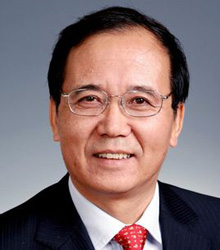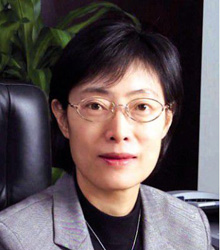PEOPLE
Academic Champion
 |
|
(FILE) |
Lin Jianhua, a 60-year-old chemist, was recently named the 27th president of Peking University.
Lin was born in Gaomi, east China's Shandong Province. He studied chemistry at Peking University, gaining his doctorate degree in December 1986. He went on to teach at his alma mater. From 1988 to 1993, he carried out research in several laboratories in Germany and the United States.
After spending more than three decades studying and working at Peking University, Lin consecutively occupied the roles of president of Chongqing University and president of Zhejiang University between 2010 and 2015.
Addressing the faculty and staff on February 15, Lin stressed that the individual ideals of teachers and students should be in accord with "core socialist values," while maintaining that the university should stick to its traditions and should not "abandon academic independence and dignity."
EXIM Bank Chairwoman
 |
|
(FILE) |
Hu Xiaolian, Deputy Governor of China's central bank, was recently appointed chairwoman of the Export-Import (EXIM) Bank of China.
Hu, known as an expert in financial circles, was born in August 1958. She graduated from the Graduate School of the People's Bank of China with a master's degree in economics in 1984. She headed the State Administration of Foreign Exchange from 2005 to 2009.
Hu was ranked 23rd on The Wall Street Journal's list of "the 50 Women to Watch in 2007." She ranked fourth on the same list the following year and was referred to as "one of the most powerful people in the world."
Founded in 1994, the China EXIM Bank is solely owned by the Chinese Government. Its missions include facilitating the export and import of hi-tech products, and assisting Chinese companies in their offshore project contracting and outbound investment.
QUOTE
"In the face of incessant regional conflicts and wars, no country can win all battles alone. We need to safeguard the authority of the Security Council, and let the UN play its role."
Wang Yi, Chinese Foreign Minister, speaking to the media after presiding over a UN Security Council open debate on maintaining international peace and security in New York City on February 23
"Seven percent should be the minimum. Otherwise, the situation with regard to unemployment and other social ailments could worsen and present an obstacle to reform."
Wei Jianguo, Vice Chairman of the China Center for International Economic Exchanges, a Beijing-based think tank, referring to the Central Government's year-on-year GDP growth target
"The Party and the government should introduce more measures to ensure that the public is able to supervise and scrutinize every government employee."
Zhu Lijia, a professor of public administration at the Chinese Academy of Governance, commenting on the Central Commission for Discipline Inspection's recent vows to carry out a long-term anti-corruption campaign
"Both cities have the capability. The question is, which city is more suitable for the 2022 Winter Games."
Wei Jizhong, former Vice President of the Chinese Olympic Committee, pointing out that Beijing's odds of success in applying against Kazakhstan's Almaty to host the Games are roughly 50-50
MEDIA DIGEST
Conference Ambassadors
Oriental Outlook
February 12
A trend has in recent years emerged for cities to hire conference ambassadors, professional individuals in certain fields who attempt to attract forums, expositions and conventions to their respective cities. These ambassadors generally provide services free of charge.
Three cities on the Chinese mainland possess conference ambassadors: Shanghai, Beijing and Hangzhou in east China's Zhejiang Province. Shanghai was the first mainland city to recruit conference ambassadors in 2006. The city has since appointed 98 experts and talented professionals from a number of fields as conference ambassadors.
Thanks to the efforts of such ambassadors, the number of international conferences held in Shanghai has risen in recent years. Shanghai hosted 72 international association meetings in 2013, ranking it 29th in the world, a climb of six spots from the previous year.
Large international industry associations regularly hold meetings, often once a year or every two years. These associations usually make high demands of the host countries of their meetings. Some associations have never held a meeting in a developing country. Sometimes, it is said, it is no easier to bid for an international association meeting than it is for the Olympic Games.
Not only can an international meeting help present to the world China's achievements, but it also brings with it a host of economic opportunities and a chance to promote the host city's popularity.
Huawei's Overseas Expansion
Caixin Century Weekly
February 9
Ren Zhengfei, founder and CEO of the telecom behemoth Huawei Technologies, made a formal appearance at the World Economic Forum in Davos earlier this year. Among fellow leaders in the global telecom industry, Ren is regarded as a relatively low-key and even enigmatic figure.
Ren founded Huawei in Shenzhen in 1987. The rarity of his public appearances once sparked speculation that he possessed connections with the military. In 2012, such conjecture prompted the U.S. Congress to launch an investigation into Huawei, which was attempting to enter the U.S. market at that time, and to subsequently block the company from entry into the mainstream U.S. market. Despite these setbacks, Huawei has now become a global telecom equipment company with an annual sales volume of $46 billion and branches in 170 countries or regions worldwide.
The company first entered the foreign market in 1998. Like other Chinese companies, it initially focused on developing countries in the Middle East, Africa and Asia. Later, Huawei expanded from developing countries to more mature markets in Europe such as France and Britain. While the company largely pursued a low-price strategy in developing countries, Ren found that European customers cared less about prices than quality.
Huawei's success in Europe has raised the company to new heights. By January 2014, Huawei had established two research centers in Europe, set up six competency centers in areas such as finance, sales and service, and employed 7,700 people. It also cooperates with prestigious European companies such as German Telecom, Vodafone and BMW.
Lost in Translation
Beijing Morning Post
February 16
As the Chinese celebrated the 2015 Lunar New Year on February 19, many in the British and U.S. media were confused regarding whether this year should be referred to as the Year of the Sheep or the Year of the Goat. The confusion arises from the fact that this year's zodiac animal called yang in Chinese, a generic term that encompasses both sheep and goats.
There are 12 zodiac animals in China and different zodiac animals embody different meanings. Although in Mandarin, there is no requirement to specify which kind of hoofed beast this year's zodiac animal is, the English language demands that the breed of the animal be elaborated upon.
Whether this year's zodiac animal is a goat or a sheep is a matter of confusion not only for foreigners but also for many Chinese. Folklore experts say that either would be acceptable. However, this may further muddy the water abroad, because in Western culture, goats are associated by some with the dark arts and satanic ritual while sheep, conversely, are regarded as being meek and docile.
Like the goat, the dragon zodiac animal, which is perceived as magnanimous by the Chinese, is also traditionally thought to be evil in Western culture. It is understandable that different interpretations of the same animal have arisen owing to differences between Chinese and Western cultures. However, in order to better communicate Chinese culture to foreigners, we should make a translation of Chinese culture that is tailored for foreign interpretation.
